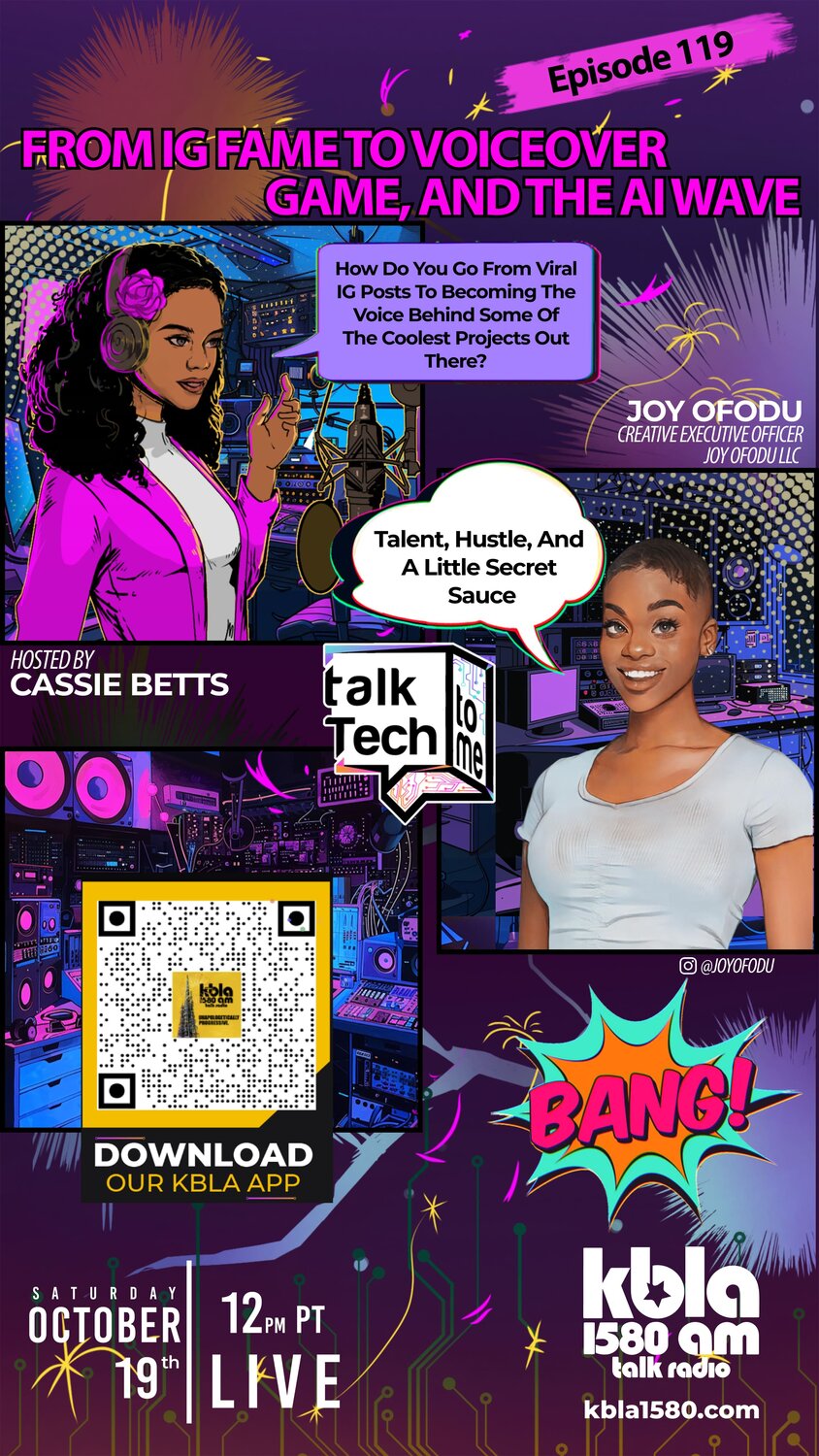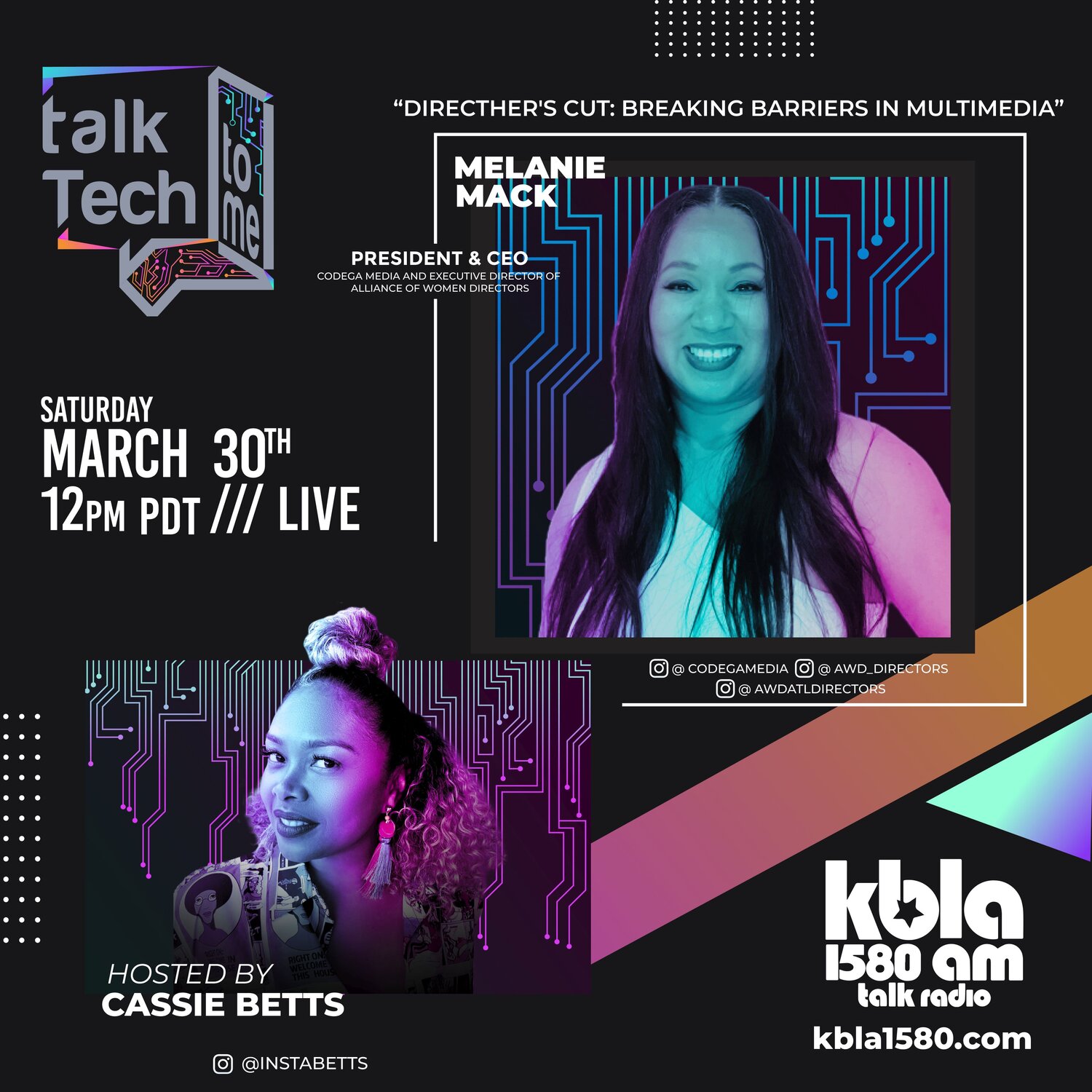

Ep-115 - “Is This Still Funny? Podcasting, Comedy & Cancel Culture Collide”- Cassie Betts
Episode: 115
Guest: Cassie Betts
Is This Still Funny? Podcasting, Comedy & Cancel Culture Collide
In today’s world of podcasts, comedy, and cancel culture, finding the line between edgy humor and offensive content can be tricky. Episode 115 of "talktechto.me," hosted by Cassie Betts on KBLA Talk 1580, explores this tension. The show dives into the controversies surrounding popular podcasts, problematic humor, and the impact of cancel culture on comedy. Is cancel culture justified, or are comedians and podcasters being unfairly censored?
The Debate: Where Is the Line?
In this episode, Cassie discusses how Black Twitter reacts to problematic podcasts and whether recent cancellations were deserved or overblown. Specifically, she highlights a controversy involving the UK-based podcast "ShxtsNGigs" (SNG), which faced significant backlash after the hosts, James Duncan and Fuhad Dawodu, laughed at a racially insensitive joke about Black women on the “Flagrant” podcast. The episode, which aired in July 2024, resurfaced online, leading to a viral clip that brought the SNG hosts under fire.
The discussion delves into the context of the joke, with “Flagrant” hosts Andrew Schulz and Akash Singh making stereotypical remarks about the “Black Girlfriend Effect,” suggesting that white men dating Black women experience undue stress. Duncan and Dawodu apologized during their podcast, explaining they felt trapped in a “fight or flight” situation. However, the "Flagrant" hosts refused to apologize, defending their statements as jokes and claiming that apologizing would mean apologizing for their existence as comedians.
This debate raises important questions: Can comedians still push boundaries without crossing into offensive territory? Is cancel culture stifling creativity, or is it holding people accountable?
Tech Meets Comedy: The Role of Cancel Culture
Cancel culture doesn’t just affect comedians—it extends into the world of podcasting and tech. Elon Musk, CEO of X (formerly known as Twitter), recently found himself under Secret Service investigation after a post on X regarding the second assassination attempt on former President Trump. Musk’s post, which he claimed was a joke, sparked backlash and led to an investigation. In today’s digital age, the line between humor and serious threats has become blurred, and tech platforms play a significant role in moderating content.
Cassie also touches on how social media platforms, like X, magnify the reach of cancel culture. One viral clip or post can lead to widespread outrage, and platforms are constantly navigating the tension between free speech and moderation.
High-Profile Cancellations: Lessons Learned
Cassie further discusses the impact of cancel culture on high-profile celebrities and comedians. Kevin Hart, for example, faced backlash in 2019 for homophobic tweets that resurfaced from 2009-2011, leading him to step down from hosting the Oscars. Hart chose to address the controversy head-on, but the experience showed how social media can reignite old content and affect present-day opportunities.
Similarly, Lizzo faced accusations of creating a hostile work environment and sexual harassment, which resulted in major backlash, a lawsuit, and even the cancellation of her first show post-lawsuit. Tiffany Haddish is also at risk of being canceled, facing significant hate online after a controversial skit and a lawsuit.
These examples illustrate how the online world doesn’t forget—and how one mistake or misstep can have lasting consequences for public figures.
Problematic Podcasts vs. Beloved Ones
While cancel culture affects many, not all podcasts fall into the problematic category. Cassie mentions that hetero male-led podcasts like Kevin Samuels, DJ Akademiks, DJ Vlad, and Andrew Tate have sparked controversy due to their inflammatory content, leading to a disconnect with audiences.
In contrast, podcasts like "Club Shay Shay," "Nice & Neat," and "Hardly Initiated" have managed to gain loyal followings without sparking the same level of controversy. These podcasts provide thoughtful content and, in many cases, avoid offensive humor altogether.
What’s Next?
In the final segment, Cassie wraps up by reminding listeners to follow her on Instagram (@instabetts and @talktechto.me) and stay tuned for more episodes of "talktechto.me." She also highlights the "Animate Our World Bootcamp," which offers aspiring AI animators a chance to learn new skills, gain mentorship, and receive job placement assistance. This program, supported by the SoLa Foundation, provides scholarships for justice-impacted, foster youth, unhoused, and low-income individuals.
The debate over cancel culture, comedy, and the future of podcasting is far from over. "talktechto.me" continues to explore these timely issues, pushing the boundaries of tech, media, and culture one keystroke at a time.
If you want to stay ahead of the curve in tech and media, follow Cassie Betts and "talktechto.me" on Instagram, and check out Made In South LA (MISLA) at misla.org.
This has been “talktechto.me,” pushing the envelope of tech one keystroke at a time. Peace out!
You Might Like
- 10/20/2024
- Ep. 119
From IG Fame to Voiceover Game, and the AI Wave
- 07/22/2023
- Ep. 54
The Art of Storytellin’: From Riots to Red Carpets
- 01/13/2024
- Ep. 79
Podcast Pioneer to Future Shaper: Espree Devora Gets It Done
- 03/30/2024
- Ep. 90



